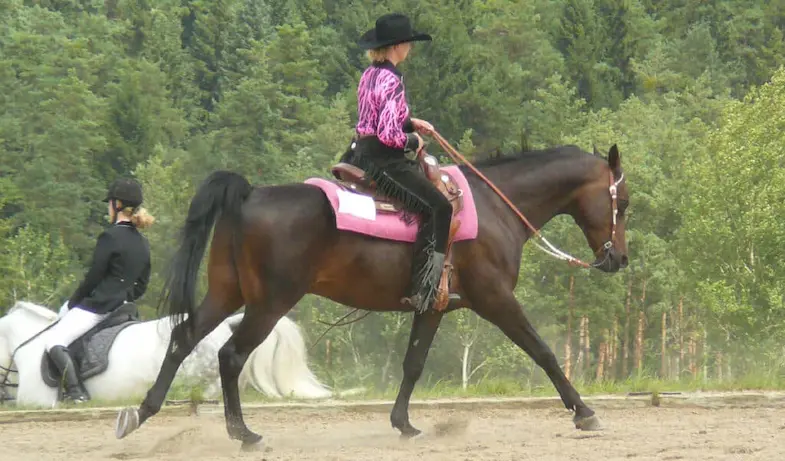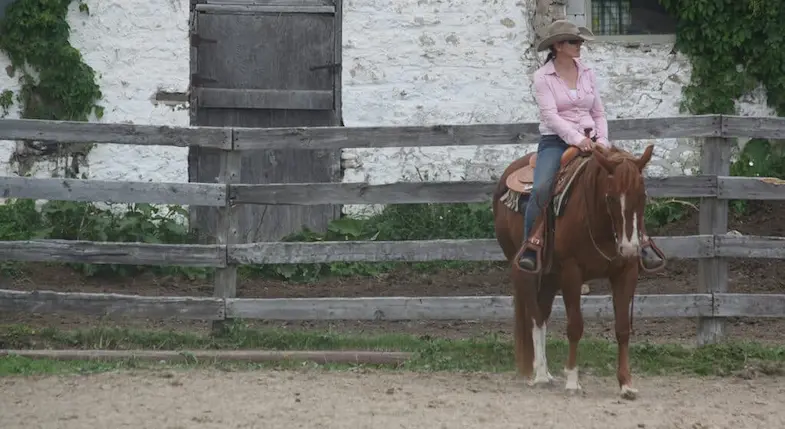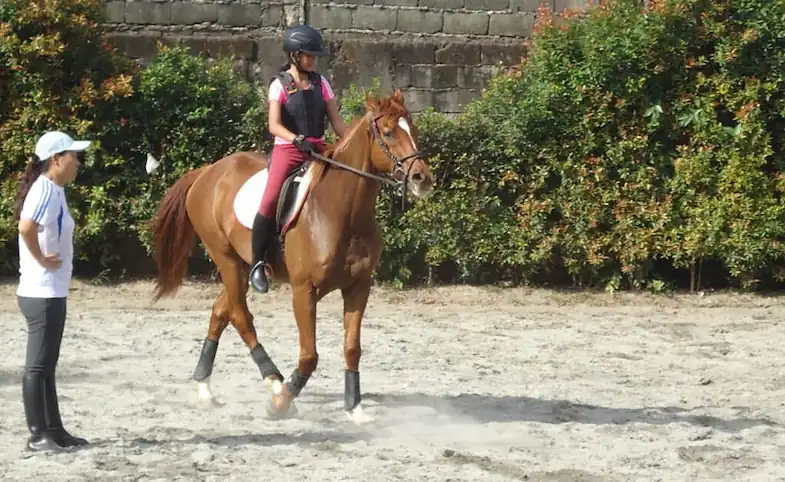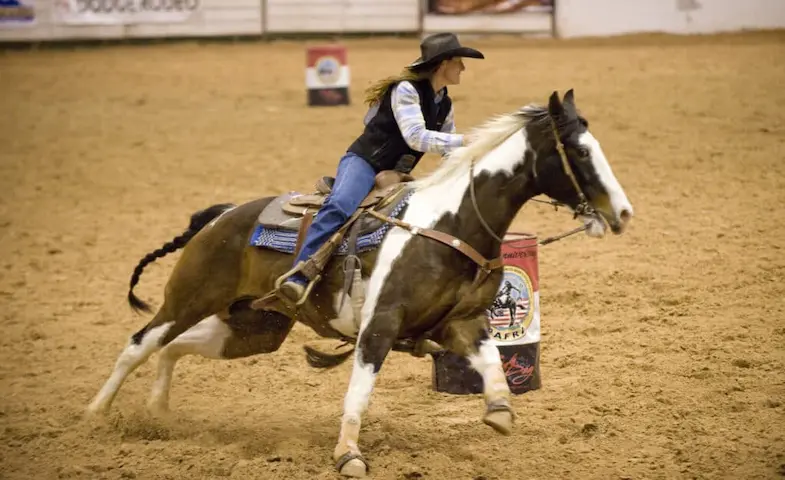Life gets hectic, and even the most horse-crazy equestrians take time off. Between ages 6-24, I took lessons pretty consistently. But once I landed a corporate job after college, discovered kickboxing, and tired of riding horses that were never my own, I stopped — for almost a decade.
Returning to horse life in my early thirties was eye opening. I assumed I could pick up where I left off without missing a beat. After all, I had moved to the heart of Montana horse country and was finally ready to lease (or buy!) my first horse. How hard could it be?
Get Back in the Saddle
In this article, I’ll offer 10 riding refresher tips for returning to the ring after a break. These are all things I wish I would’ve known after my extended break from horses. Challenges aside, it’s worth it to get back in the saddle — no matter how long you’ve been away.
1. Be honest about where you are NOW
Maybe you grew up showing Hunter Jumpers every weekend, fearlessly cantering from oxer to oxer and scooping up the blue ribbons. Perhaps you ran barrels with friends as a teenager, thrilled by the adrenaline rush. Or, maybe you were schooling second-level dressage movements with ease.
That was before, and this is now. Returning to riding after a break means being honest about where you are not — now where you left off before.
Jobs, family, fitness, mindset, student debt, and a host of other factors will all impact your return to riding. Though your experience may not closely resemble what you remember from your past, new adventures await that can be just as sweet.
Key Considerations:
- Think about the aspects of equestrianism you miss most — and want to get back.
- Consider the level of risk you’re comfortable with at this point in your life.
- Choose a discipline and riding style (English or western) that is the best fit for you now.
- Decide what type of horse(s) you are equipped to ride.
- Be honest about the amount of time and money you have to spend on your hobby.
2. Improve your physical fitness
If you’ve ridden for any period of time, you know that the muscles used in the saddle are unique. Even people who regularly run, lift weights, or cycle can (and will!) be sore returning to horse riding.
Balance, flexibility, and coordination also change as you age. Your body moves and responds differently now, and it’s important to realize that your safety around horses is directly correlated to physical fitness.
Key Considerations:
- Commit to healthy eating habits that support the physical demands of riding.
- Be honest about your weight and how it may affect your physical capabilities.
- Develop a plan to improve your cardio and stamina when you’re not at the barn.
- Consider adding a regular yoga practice to help with balance and core strength.
- Ride, ride, ride. Nothing gets you in shape for riding horses better than… riding!
3. Improve your mental fitness
Riding well requires a body that is ready and able – as well as a mind. If you’re returning to the saddle after an extended period of time, you might be surprised by butterflies in your stomach. The fearless child you remember galloping across fields has likely been replaced by an adult who understands emergency room bills, worries about looking silly around more confident riders, and struggles with anxiety.
Rest assured, that’s normal. Adults have different mindset challenges when it comes to riding, but they are not insurmountable.
Key Considerations:
- Develop a mindfulness practice at home, including visualization and deep breathing.
- Realize that you can be excited and truly want to ride – yet still feel nervous.
- Start slow to build your confidence and skills back up step by step.
- Choose a trainer who will help you work through mental blocks in a healthy and productive way.
- Check your pride at the barn door. Returning to your previous riding level isn’t going to be a linear process, so expect ups and downs along the way.
4. Join a lesson program
One of the best ways to get your mojo back around horses is to take regular lessons. Scout the barns in your area, ask to watch some lessons, then choose the program that offers the level of support you need at this point in your riding journey.
Key Considerations:
- Discuss your previous experience and reasons for returning with your new instructor.
- Try to ride at least once per week on a consistent schedule.
- Talk about the type of lesson horse that might be a good match, but be willing to try more than one.
- Be willing to start slow, even if that means unmounted lessons to refresh your memory and practice the basics from the ground.
- If you’re able, practice what you’re learning between lessons on your own.
5. Put safety first
Older riders, or those returning after a gap year(s) or injury, may feel self-conscious about taking greater safety precautions. It can be especially tough if those around you are riding without helmets, safety vests, or doing activities you feel are unsafe or too advanced.
Riding is a dangerous sport, and you never have to apologize for putting your safety first. That starts with always (always!) wearing a helmet and appropriate footwear.
Key Considerations:
- Buy a new, properly-fitted helmet, and use it every ride — every time.
- Wear close-toed shoes with a heel.
- Be aware of your surroundings at all times.
- Consider getting a body protector and/or air vest.
- Only engage in activities you and your horse are properly trained to do.
6. Identify your goals
With age comes maturity – and different priorities. You may have loved competing every weekend in your youth, but now you have kids with soccer games or a highly-demanding job. It’s okay for your riding goals to be different than they used to be, but having goals is just as important.
Key Considerations:
- Think carefully about why you want to return to riding. What is it you miss the most?
- What is a realistic amount of time and energy you can spend riding? Weekly lessons? Monthly trail rides? Occasional riding vacations?
- What are 10-15 riding goals – big and small – that you want to accomplish in the next year.
- Do you want to compete? If so, which discipline and at what level?
- Are you interested in buying a horse of your own in the near (or distant) future?
7. Build up your horse fund
Equestrian sports are notoriously expensive, even if you don’t plan to own a horse. From lessons and gear to events and vet bills, your bank account will notice you returned to riding.
It’s important to build up your horse fund early – and steadily – so financial stress doesn’t impact your ability to enjoy riding.
Key Considerations:
- Put a set amount of money aside every week or month for your horse habit — even if it’s $20 at a time, every little bit helps.
- Track your horse-related expenses carefully so spending doesn’t get out of hand.
- Plan your event schedule early so you can budget for the clinics and shows you want to attend most.
- Be honest about your financial situation, and be willing to say no to expenses that push you outside your comfort zone.
- Think about creative ways to lower your horse expenses, like cleaning stalls, providing professional services to the barn owners, or buying used tack and gear.
8. Surround yourself with good people
Riding is both a solitary activity and a community one. You may think it doesn’t matter much who else is boarding at your barn or taking lessons with you, but nothing could be farther from the truth.
Every barn has a “vibe”, so try your best to find one that is full of kind, fun, and compassionate people. You want to feel welcome and supported as you return to riding – and you deserve to be.
Key Considerations:
- Ask around about the reputations of barns in your area.
- Go watch a few lessons and see how people interact with each other.
- Talk to different trainers and see who you gel with.
- See how horses are cared for and treated before committing to a barn.
- Be a kind, fun, compassionate person to others in return!
9. Boost your knowledge out of the saddle
Riding isn’t the only way to learn, so use your time out of the saddle to keep advancing your skills. Whether you’re a visual learner who enjoys watching videos, a person who spends a lot of time listening to audiobooks in the car, or a voracious reader, there are countless ways to become a better equestrian in your “downtime”.
Key Considerations:
- Watch lessons, clinics, and shows every chance you get.
- Read educational books about horse behavior and riding.
- Browse equestrian blogs like Horse Factbook (of course!) to learn new things.
- Ask lots of questions, and never be afraid to ask for help from experienced riders and trainers.
- Follow respected equestrian vloggers and podcasters
10. Don’t buy a horse right away
If you’re returning to riding with the goal of buying your own horse, all I can say is “Whoa, Nelly!” It’s easy to get swept up in the excitement of horse shopping, but this is one decision you can’t afford to rush.
By taking all the advice listed above before buying a horse, you’ll set yourself up for success. The horse you end up purchasing will fit your current lifestyle, goals, and abilities – not the ones you used to have or hope to have in the future.
Key Considerations:
- Consider leasing a horse (or several) to help learn what you like and don’t like.
- Take lots of lessons to improve your skills, try different horses, and make sure you’re in this for the long haul.
- Learn all you can about horsekeeping, including feeding, shoeing, sheltering, and veterinary care.
- Find a trusted trainer or experienced rider to help you evaluate sale horses.
- Build up an emergency fund for the future so you can handle unexpected vet bills or other expenses that may arise once you have your dream horse.
Look Forward Not Backward
Returning to the horse world is an exciting (and sometimes nerve-wracking) prospect. By being honest with yourself about your skills, goals, and expectations, you can set yourself up for a wonderful experience. Most importantly, welcome back! We’re glad you’re here.
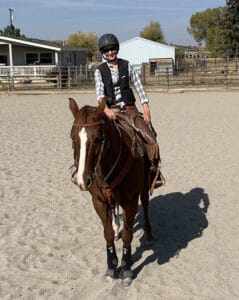
About Nicole
Nicole Ross is the founder of HorseRookie.com, an educational website dedicated to helping equestrians of all levels (especially rookies) answer common questions, make informed decisions, and have more fun with their horses.

